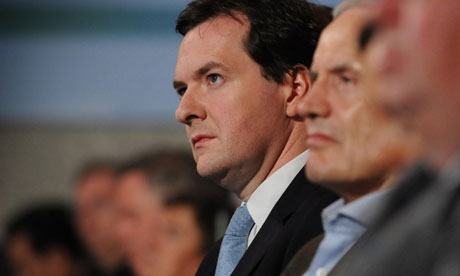Chancellor to warn at Tory party conference that poor will be worst hit by delaying action on deficit

In his speech to the Conservative party conference in Birmingham, the chancellor will announce that every Whitehall department will have its head office staff cut by a third, promise to give the armed forces the tools to finish the job, and dismiss Britain's public service structure as designed for the 1950s.
He will audaciously offer the deficit reduction plan as an example of his One Nation Conservatism, rather than an ideological assault on the state, and will hold out the prospect of lifting more people out of tax through raising thresholds.
He will insist that "there will be no cuts for its own sake, but instead savings to secure our future".
However, Osborne will warn that Labour's prescription of a slower deficit reduction would mean extra interest payments to foreign governments in addition to the £120m currently being paid each day. "Delay now means pay more later. Everyone knows it's the most basic rule of debt. So Labour's cuts would not be smaller – they would be bigger and last longer," he will say, leading to "a decade lost to debt".
His speech two weeks before the spending review betrays coalition nerves that the public supports deficit reduction in principle, but will recoil from the speed, scale and specifics of the government's plan.
In a conference certain to be dominated by the coming spending cuts, both David Cameron and the work and pensions secretary, Iain Duncan Smith, strongly hinted that some universal benefits will have to be cut in part to implement a 10-year total overhaul of the welfare system, ending with the merger of tax credits and a range of work-related benefits.
Duncan Smith said the payment of benefits to people earning more than £50,000 a year was "completely bonkers", remarks that suggest the government is willing to tax child benefit, or restrict other universal benefits such as the winter fuel allowance.
The withdrawal of some universal benefits from middle-class families has won the surprise support of Martin Narey, chief executive of Barnardo's. Writing in the Guardian, he says the case for reform is now morally overwhelming.
The coalition's proposed universal credit will be phased and initially focused on those on jobseekers' allowance and on incapacity benefit, with a guarantee that anyone transferring to the new credit will not lose money. The scheme, designed to remove disincentives to work, will have an upfront cost.
Cameron confirmed that a deal had been struck between Osborne and Duncan Smith on a "refreshingly radical" plan for welfare reform, but the decade-long timescale gives the Treasury time to see whether the scheme is workable.
In his speech Osborne will also seek to counter Labour leader Ed Miliband's accusation that the coalition has a pessimistic vision of Britain's future and is using the deficit as a cover for cuts. He will insist his aim is to build "a hopeful, united and prosperous country". "You don't get to chose the times you live in," he will say. "But you do get to choose how you live in them. And just over the horizon lies the Britain we are trying to build."
His priority in the spending review will be to support growth through investment in transport schemes, medical research and communication networks. In an interview with the Guardian tomorrow the transport secretary, Philip Hammond, reveals an extra £800m of public money will be pumped into Britain's high-speed rail network.
Osborne will also list a string of announcements in the spending review that will please Liberal Democrat colleagues in the coalition, including public funding for green investment, and carbon capture and storage "so we reap the financial rewards of the green energy revolution".
He will also promise to press ahead with a pupil premium so "the poorest in our country have access to the kind of education only available to the best".
He will defend the public service reforms, saying: "We saw over the last 10 years that more money without reform was a recipe for failure. Less money without reform would be a recipe for disaster." He said changing the way services such as education, health and the police work "is no longer a luxury; it has become a necessity."
In the other crucial conflict in the spending round – defence – supporters of the defence secretary, Liam Fox, were claiming he was making progress in resisting some of the Treasury's demands on his budget.
Cameron promised not to take "risks" with Britain's defences, insisting he was pro-defence. Fox last week wrote privately to the PM warning that "draconian" reductions being demanded by the Treasury in his department would have "grave consequences" for the armed forces.
Source
No comments:
Post a Comment